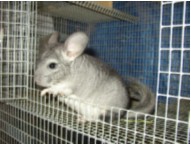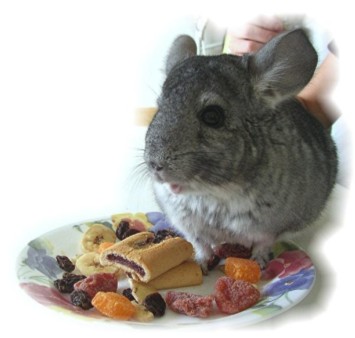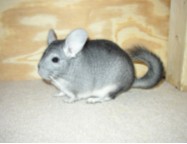Author: Amanda Dean
Fuzzy Chins
Gut Feeling
A Chinchilla facing severe pneumonia
 Has anyone ever told you, “Just go with your gut feeling” or “a mother just knows”? I have heard these sayings many times throughout my life but never understood how anyone could trust their gut feeling, after all, how does your gut know what’s right and what’s wrong. However, due to a recent occurrence with our Standard gray 11-month old chinchilla Wally, he helped teach me to trust those voices in my heart and gut.
Has anyone ever told you, “Just go with your gut feeling” or “a mother just knows”? I have heard these sayings many times throughout my life but never understood how anyone could trust their gut feeling, after all, how does your gut know what’s right and what’s wrong. However, due to a recent occurrence with our Standard gray 11-month old chinchilla Wally, he helped teach me to trust those voices in my heart and gut.
The end of April was fast approaching and many changes were happening in my life, thus many changes were happening to my chins too. I was getting married out of town on May 22nd, buying a house and packing to move our household immediately following our honeymoon. My chins were very sensitive to my stress and frustration, but they helped me every night to de-stress and take a break. One night while Wally was out playing with his cage mate Bandit, I noticed that he was making crackling noises when he was breathing. The congestion sounds were not loud and not pronounced and seemed to only manifest when he was racing around the playpen. Wally was very active, eating and pooping normally. I mentioned to my fiancé that Wally sounded congested and I hypothesized that he had a slight cold. I tend to be a very nervous mommy and “over react” to small changes, so this time I tried to convince myself that Wally’s congestion was more in my head than his.
I kept a close eye on Wally over the course of the following week. I continued to observe that Wally was eating normally, full of energy but I still occasionally heard the crackling sounds of congestion. Wally was showing no other obvious signs of distress so I reasoned that if it was a “cold”, it was not serious and his immune system would take care of it. My heart and gut were screaming to take Wally to the vet, but my head was getting in the way.
On Tuesday, May 4th I came home from work to find Wally in serious respiratory distress. His sides were sunken in, he had dropped 35g in a day (he weighed 605g and the day before he was 640g), he was not active and he was breathing hard and fast. I immediately called our vet but it was too late in the evening to bring Wally in. I discussed the options with the technician and I made an appointment for Wednesday morning. I kept Wally comfortable and if he needed it, I had some pain medication to give him. It was an incredibly long evening and I couldn’t get to the veterinary clinic fast enough on Wednesday, May 5th.
Wednesday, May 5, 2004:
Wally and I arrive at the vets and I feel much better when I see Dr. David. Wally weighed 595g at the clinic. Dr. David noted Wally’s respiratory distress, however, there was no nasal discharge nor could he hear any crackles or wheezes in Wally’s lungs, and his eyes were clear. The oral cavity exam showed no obvious points, there were no obvious heart murmurs, no palpable masses and Wally’s body condition was good, despite his sudden weight loss. Dr. David suggested two possible diagnoses: Bacterial pneumonia or cardiac disease (which was unlikely due to Wally’s young age). Wally was sedated so Dr. David could take x-rays of Wally’s chest and intestines. In viewing the radiographs, we saw a significant opacity in the caudal dorsal lung fields. A normal lung radiograph will show a black space, however, Wally’s lungs were significantly white in the x-ray. Wally’s cardiac silhouette was within normal limits, which meant there were no obvious signs that Wally’s health problem was related to cardiac disease.
Dr. David did not want to completely rule out heart disease, but he was leaning closer to the diagnosis of severe bacterial pneumonia. I was baffled how Wally might have caught this infection because I have read that overcrowding, poor ventilation and high humidity causes pneumonia and none of the above applied to our household. No foreign sprays had been used and his routine had not been changed, except that I was a little more stressed with life’s current events. None of my other chinchillas had shown signs of respiratory distress or illness.
Wally would spend the night at the hospital in great hands with Dr. David and his staff. It was incredibly hard to leave him, not knowing if the antibiotics would work or not. Dr. David started Wally on the following treatment
|
Treatment
|
Dose
|
Time
|
Duration
|
|
Lasix 10 mg/ml
|
0.1 ml
|
Twice daily
|
5 days
|
|
Tri-meth-Sulfa
(Bactrim) 48mg/ml
|
0.37 ml
|
Twice daily
|
14 days
|
Lasix (a diuretic) was used to pull off any excess fluid that might be surrounding the heart and the tri-meth-sulfa is a broad range antibiotic that would go after a bacterial infection in the lungs.
Wally continued downhill after I left the clinic, the respiratory distress worsened, he didn’t want to eat and his sides were still sunken in. Wally was placed in an oxygen chamber and given a puff of albuterol (which is a bronchodialator) to help open up his respiratory passages. Dr. David made a special trip later that evening around midnight to take Wally out of the oxygen chamber so there was no possibility of Wally overheating. Baytril, 0.2 ml (a different antibiotic) and 0.01 ml of terbutaline (pain medication) was administered along with a little tender loving care.
Thursday, May 6, 2004
Dr. David spoke with me first thing in the morning with an update on Wally. He was more stable and eating and passing larger feces. However, Wally was still showing respiratory distress, which concerned both of us. During the day, while I was at work, Dr. David would try to wean Wally off of the oxygen and see how he responded.
I visited Wally in the afternoon and he was looking slightly better. He ate for me, which was encouraging. Unfortunately, with his breathing still rapid, we decided to have him stay another night at the clinic and evaluate him the following morning. Dr. David was continuing with the following treatment:
|
Treatment
|
Dose
|
Time
|
Duration
|
|
Lasix 10 mg/ml
|
0.1 ml
|
Twice daily
|
5 days
|
|
Tri-meth-Sulfa
(Bactrim) 48mg/ml
|
0.37 ml
|
Twice daily
|
14 days
|
|
Baytril 22.7 mg/ml
|
0.2 ml
|
Twice daily
|
14 days
|
|
Terbutaline 1mg/ml
|
0.01 ml injection
|
When needed
|
|
Friday, May 7, 2004
Wally showed lessening respiratory distress during morning rounds, however, the antibiotics were starting to take their toll on his tummy. Wally was not eating well and fecal production had stopped. Dr. David assist fed Wally with critical care and laxatone to help with the GI tract motility. Yogurt was also given about 3 hours after antibiotics were administered to help restore normal intestinal microflora. Wally’s weight had decreased to 590g and the same antibiotics and pain medications were still being administered.
During my visiting hour with Wally, he was feisty, but didn’t seem interested in any treats or food. There was a remarkable improvement with his breathing, but now his lack of eating and pooping concerned us. It was so hard to leave him yet another night at the clinic, but I was encouraged that he was still fighting and hanging in there. I also was relieved that he was in the best and most capable hands with Dr. David and his staff. Hopefully soon I would be able to bring Wally home, healthy and happy. Until then, he would get the best care.
Saturday, May 8, 2004
I was the first one at the clinic on Saturday, anxiously waiting my visiting time with Wally. The staff was just finishing up Wally’s morning medications and then brought him down to me so I could feed him critical care. Wally’s breathing was stable and almost back to normal which thrilled me. He was very active but still not eating great, in my opinion due to the antibiotics. His weight was up to 604g and was taking pedialyte, critical care and yogurt. Laxatone was still being added to help the GI tract movement and prevent any further complications. Wally was looking better, but Dr. David and I still felt that he needed to stay at the hospital until Monday, just to make sure he was on the road to recovery. All week I had driven two hours from work to the clinic and 3 hours home, just to spend an hour with Wally. I made it a point not to miss a single day with him, but Sunday the clinic was not open. I would talk to Dr. David after Wally’s medications were administered, but it killed me not to see him. However, I had to do what was best and so Wally was destined to spend another 2 nights at the clinic.
Sunday, May 9, 2004
Wally was up to 620g and started to become big boss at the clinic. He was taking the assist feeds like a pro and continued to take all his medications. Dr. David noted that Wally was much brighter and the respiratory distress was much improved. He was starting to put up more resistance when handled, which was also a promising sign that he was feeling better and ready to come home.
Monday, May 10, 2004
Wally looked great this morning. I couldn’t wait to see him after work. Even though Wally was still not eating on his own, we decided he was well enough to come home finally with me. I would continue with the assisted feedings and antibiotics. The lasix and terbutaline was discontinued because by this point we were pretty sure it was bacterial pneumonia and Wally did not seem in need of any pain medication.
It was wonderful to bring Wally home!
 |
Once Wally came home, he only continued to improve. He finished his 14-day round of antibiotics and was assist fed for a couple of weeks. Wally just celebrated his first birthday, and is amazingly well.
It has been 2 months since Wally was sick and you would not know from looking at him, anything had ever been wrong. He is working to put back on all the weight he lost and enjoys playtime a lot more now that he can breathe easier. Every morning that Wally greets me at the cage door, I look at his sweet face and am so thankful that he is still with me. He is special for so many reasons and I cannot imagine my household without him. |
We were very fortunate to have such a young fighter in Wally and also an excellent vet that was able to turn a possibly tragic situation into a miracle. If I would have listened to my gut and my heart when it was screaming to take Wally to the vet, I could have avoided this ordeal. I have learned to trust my instincts and listen to what the chinchillas tell me through their body language.
A mother will always know.

|
|